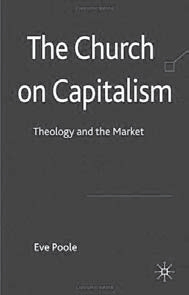 The Church on Capitalism:
The Church on Capitalism:
Theology and the Market
by Eve Poole
Palgrave Macmillan, 2010
Hardback, 232 pages, £65
ISBN 978-0-230-27516-4
This book is an outworking of a doctoral thesis and its aim is to examine the Church of England’s engagement with capitalism from 1989 to the present. It goes on to make ‘a number of specific suggestions as to how the Church might rise to the challenge of influencing the global marketplace’ (p.3). Eve Poole attempts this in four stages.
Focussing on General Synod’s engagement with economic issues, Poole carefully outlines the way Synod operates and identifies the flaws it perceives in capitalism. The issues of ethical investment, international debt, fair trade, state support of both disappearing and nascent industries, and sustainable development have featured most prominently in Synod debates. She detects, among other things, a clear preference among Synod members for government intervention and regulation; it ‘appears not to trust business to behave well without assistance from a benign government’ (p.30). She concludes that Synod fails sufficiently to draw upon erudite and helpful resources in dealing with the complexity of contemporary capitalism (p.40). She then examines ‘key Anglican commentators’ who are renowned scholars of the market (such as R.H. Preston and John Atherton, both of whom were influenced by R.H. Tawney, alongside some important younger voices) so as to provide a broader theological lie of the land. This is an intriguing stage in the argument which makes for enjoyable and fascinating reading. By the close of this chapter Poole has left the reader with a wide canvas of Church of England views on capitalism, warts and all. As was probably her intention, the reader is now ready for her own offering of additional intellectual resources which could bolster the frailties of Synod’s current methods and resources. Only then can the market be engaged with more satisfactorily.

Global economy
With chapter three the author takes her first strides in attempting to construct a synthesis of different theological ‘types’. The aim of this is to provide more intellectual resources and a more robust basis for the Church – exemplified by Synod – to interact constructively and critically with the global market. She provides two clusters of four types, the first of which presses theology into the service of a particular world view, and the second of which is more concerned with method or ‘etiquette’. From these she gleans what she calls key ‘taxonomical’ criteria, using ‘taxonomy’ to suggest scientific preciseness and absoluteness, although she reminds the reader that in theology taxonomical criteria can only function metaphorically rather than literally (p.93). H. Richard Niebuhr, John Cobb, Paul Jones, Wesley Kort, David Tracy, George Lindbeck, Hans Frei and Rowan Williams are Poole’s main interlocutors. She admits this group of thinkers are an eclectic bunch, but departing (for the most part) from Anglican scholars allows her to consider theologies she might not otherwise have had access to in her own Anglican tradition. In this chapter her synthesis at times can feel unclear and lacks a little cohesion, perhaps due to the eclecticism of her interlocutors.
Poole evaluates these various perspectives to extract six important ‘markers’ by which to ‘strengthen the Church of England’s ability to engage in the economic debate’ (p.134). These six markers are ‘how a given theology’ (i) deals with ‘shared and asymmetric belief contexts’, (ii) ‘articulates a worldview’, (iii) ‘attends to methodological etiquette’, (iv) ‘attends to Christian doctrine’, (v) ‘attends to Christian praxis’, and (vi) ‘flexes mood’ to suit intent and audience. This fourth chapter links well with the preceding three and seeks to add these ‘markers’ to Synod’s limited resources in order to engage the global market in a more astute and educated way. Many of her observations are insightful and add layers of critique that without her new ‘criteria’ would not have come to the fore. In this sense she has accomplished what she set out to fulfil.
At one stage, Poole argues that the extent to which a given theology articulates a worldview should include (amongst several other things) a concentration upon the orders of creation. What is lacking in this engagement, however, is how the new creation, too, ought to shape the Church of England’s interaction with capitalism. For without any notion of the future to which the creation is ultimately destined, the orders of creation will lack an adequate compass or goal for engaging with global capitalism. Both Jesus’ notion of the ‘kingdom of God’ and the Apostle Paul’s notion of ‘salvation’ are oriented towards the final future destiny of all things, and Poole’s analysis would benefit from reflection on how this future impinges upon her conclusions.
Apart from a gem of a sub-section called ‘Who is thy neighbour?’ (pp.142-3), there is not much detailed biblical analysis in this project. Detailed reflection of appropriate parts of the biblical narrative would have enabled Poole to shape not only the critique of Synod’s intellectual resources so as to engage with capitalism more clearly, but would also have vigorously affected the nature of the interaction with her chosen theological typologies. At one stage I thought she might have attempted this with her mention of Duncan Forrester’s rejection of the ‘middle axiom’ in favour of a ‘narrative approach’ (p.50), but it never arrived.
Having said that, her proposals will undoubtedly advance Synod’s current intellectual resources as she offers key insights for Church of England thinking on how faith engages with capitalism. In this regard, she has provided what she promised. A worthy read!